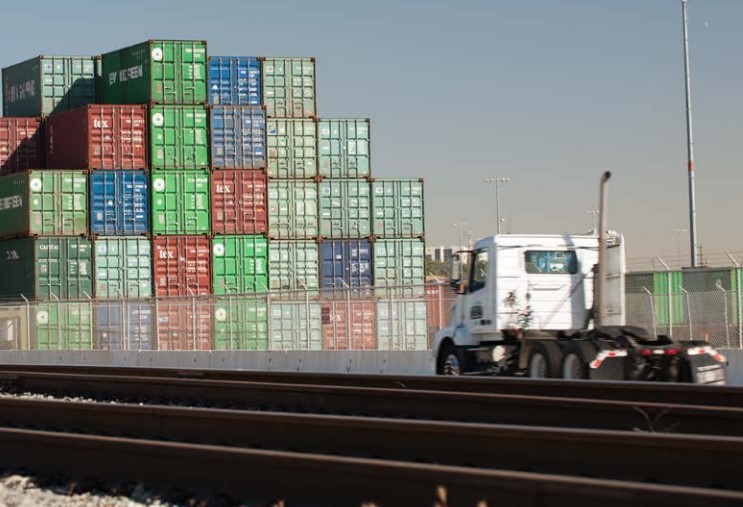A motion from Metro boardmembers Janice Hahn and Fernando Dutra seeks to re-start Metro's effort to get a 710 Freeway Clean Truck Program (CTP) underway.
For half a decade, Metro's proposed $200 million Clean Truck Program (CTP) was a sort of band-aid attached to the agency's $6 billion plan to widen the lower 710 Freeway. Part of the bargain had been that 710 corridor communities would have to suffer from demolitions and more car and truck traffic, but the mega-project would be good for air quality because Metro was going to include a not-well-defined CTP. Metro tried to assert that a CTP was a sort of 'get out of jail free' card that allowed the widening to be exempt from federal clean air law requirements. The Environmental Protection Agency rebuked Metro's claims noting that even if Metro had actually committed to (it hasn't yet) an effective (it isn't yet) CTP, then the 710 widening still violated clean air laws. The EPA, Caltrans, and Metro pulled the plug on those 710 plans, sending Metro's Highway Program back to the drawing board to re-envision the project as a equity-centered multi-modal one.
In 2020, the Metro board approved $50 million for an initial portion of the 710 Clean Truck Program. That money had been contingent on the planned 710 widening project being approved. When the 710 project was suspended, the CTP money ended up in limbo.
Last week, Hahn and Dutra introduced a motion to revive the CTP, allocating $50 million from the 710 widening budget. The motion was heard in last week's Metro board Finance Committee meeting [video] where it met with some resistance. Dutra promoted the motion as taking immediate action toward better air quality, while setting the stage for possible state and/or federal funds. County Supervisor Holly Mitchell and L.A. City Councilmember Mike Bonin both expressed their skepticism.
In noting that she would abstain from voting to approve the CTP motion, Mitchell referenced a letter from members of the Coalition for Environmental Health and Justice (CEHAJ). CEHAJ criticized the motion for not carrying forward the commitment to zero-emission trucks that had been part of the 2020 approval. CEHAJ noted that the motion recommended: deployment of “cleanest possible” trucks where zero-emissions trucks are not “feasible” due to infrastructure constraints and “other reasons.” Since Metro proposed its CTP, groups promoting fossil fuels as "near-zero" emissions have pushed for CTP to include funding for their vehicles.
Further, CEHAJ notes that "Deployment of the I-710 CTP is premature because it comes prior to community engagement and input." CEHAJ notes that Metro set up a whole new task force on how Metro should "invest" in the 710 corridor, so Metro shouldn't shield this CTP from that public process.
The motion was not approved by the Finance Committee, but was forwarded to the full board without a recommendation.
Hahn and Dutra were listening to last week's criticism of their CTP motion and withdrew it, offering instead a new substitute motion to be considered at this Thursday's full board meeting.
In a communication with Streetsblog, Supervisor Hahn noted "Last week, we heard concerns from CEHAJ, Supervisor Mitchell, and Councilmember Bonin that this motion needed to be for a Zero Emissions program only -- not a near-zero emissions program. I agree, and that’s why I introduced this substitute motion. This motion makes clear that this will be a Zero Emissions program, developed in collaboration with our communities and stakeholder agencies."
The substitute motion indeed focuses specifically on a zero-emission Clean Truck Program. It would recommit the $50 million to seed a CTP which would be developed in collaboration with Metro's 710 task force and other stakeholders, while Metro also pursues additional federal and state funding for zero emission trucks for the 710 corridor. Metro staff would report back next year with updates.
"I support the effort underway at Metro, the COG [Gateway Cities Council of Governments], and within our communities to find a path forward on the 710 project" Hahn added. "As that process plays out, the Clean Truck Program is important enough to move forward with now, especially when there is funding available from our State and Federal Partners."
Streetsblog reached out to CEHAJ representatives who had not yet finalized a coalition response to the substitute motion.
The new motion addresses the key zero emissions issue raised by CEHAJ. Truly clean trucks would have air quality benefits for corridor communities, but the CTP has been so thoroughly intertwined with Metro and Caltrans' decades-long push to widen the 710, any push to implement a (still not clearly defined) CTP feels like it could be some kind of step toward harmful widening. If Metro implemented a truly collaborative CTP that centers community health, that might perhaps begin to build trust by addressing CEHAJ's concerns:
Metro must ensure the I-710 CTP does not promote the legacy of harming the health and wellbeing of Black and Brown communities. Cities and communities along the I-710 corridor already bear the brunt of air pollution, toxic contamination, disproportionately higher levels of pollution-related health problems, unstable and poorly paid jobs, and other social injustices. The I-710 Task Force should be utilized as a forum for community stakeholders to articulate support for zero-emissions technologies and to provide concrete bases for such support for the Metro Board’s consideration. The region’s transportation goals cannot simply be to mitigate additional truck traffic, but rather they must make the I-710 corridor a zero-emission corridor that addresses this legacy of harm.
The devil will be in the details. And Metro's past performance on those details doesn't inspire much confidence.





